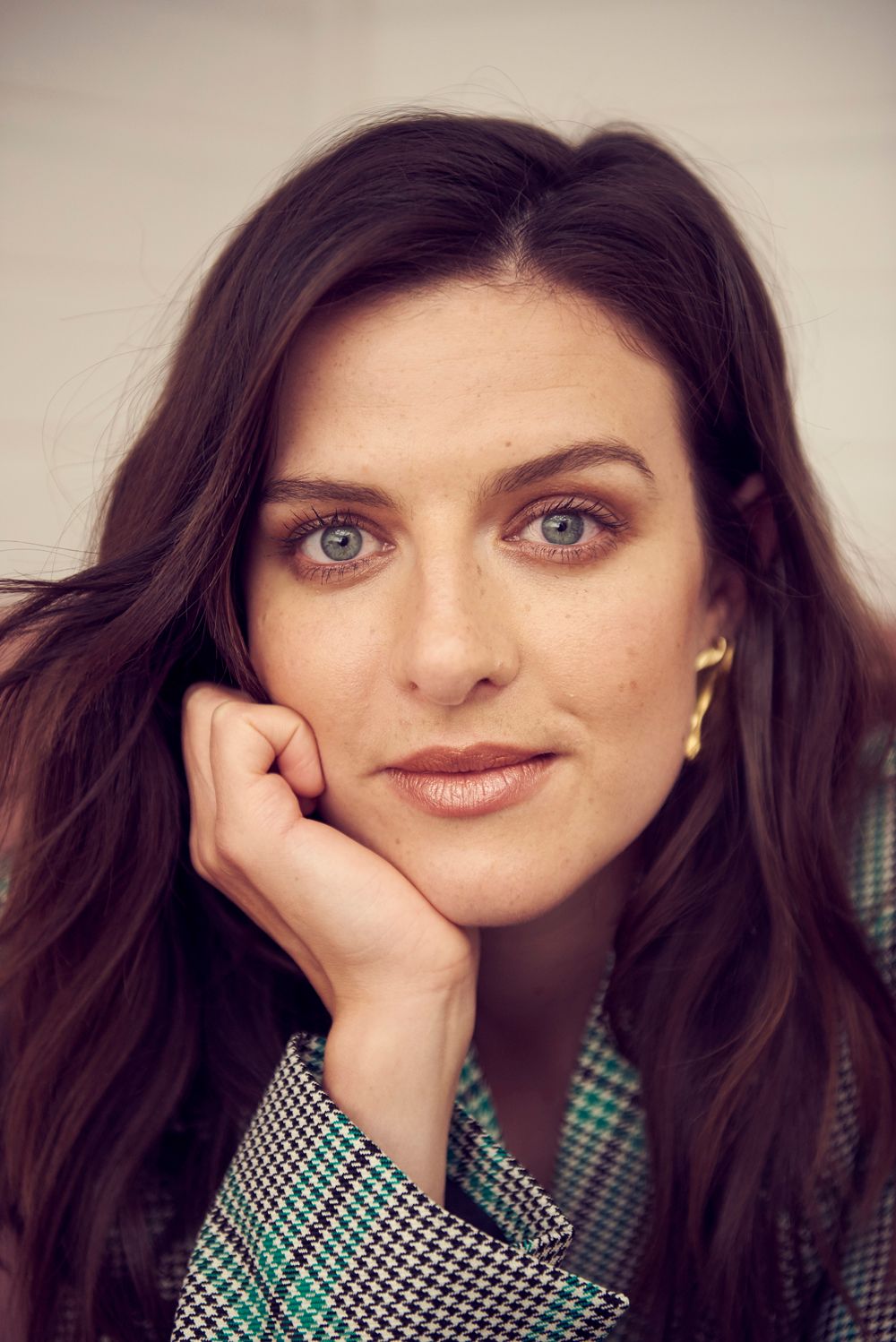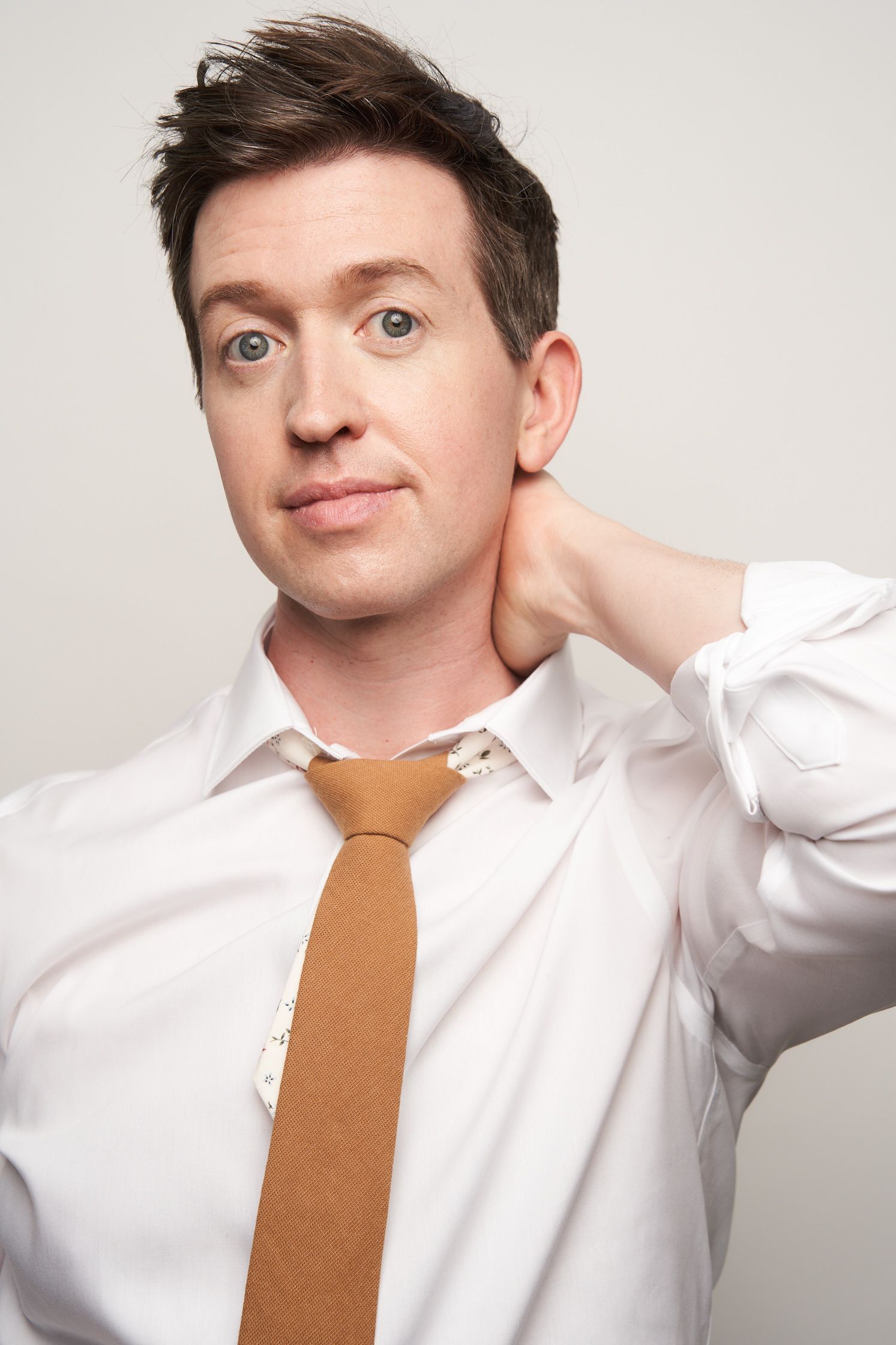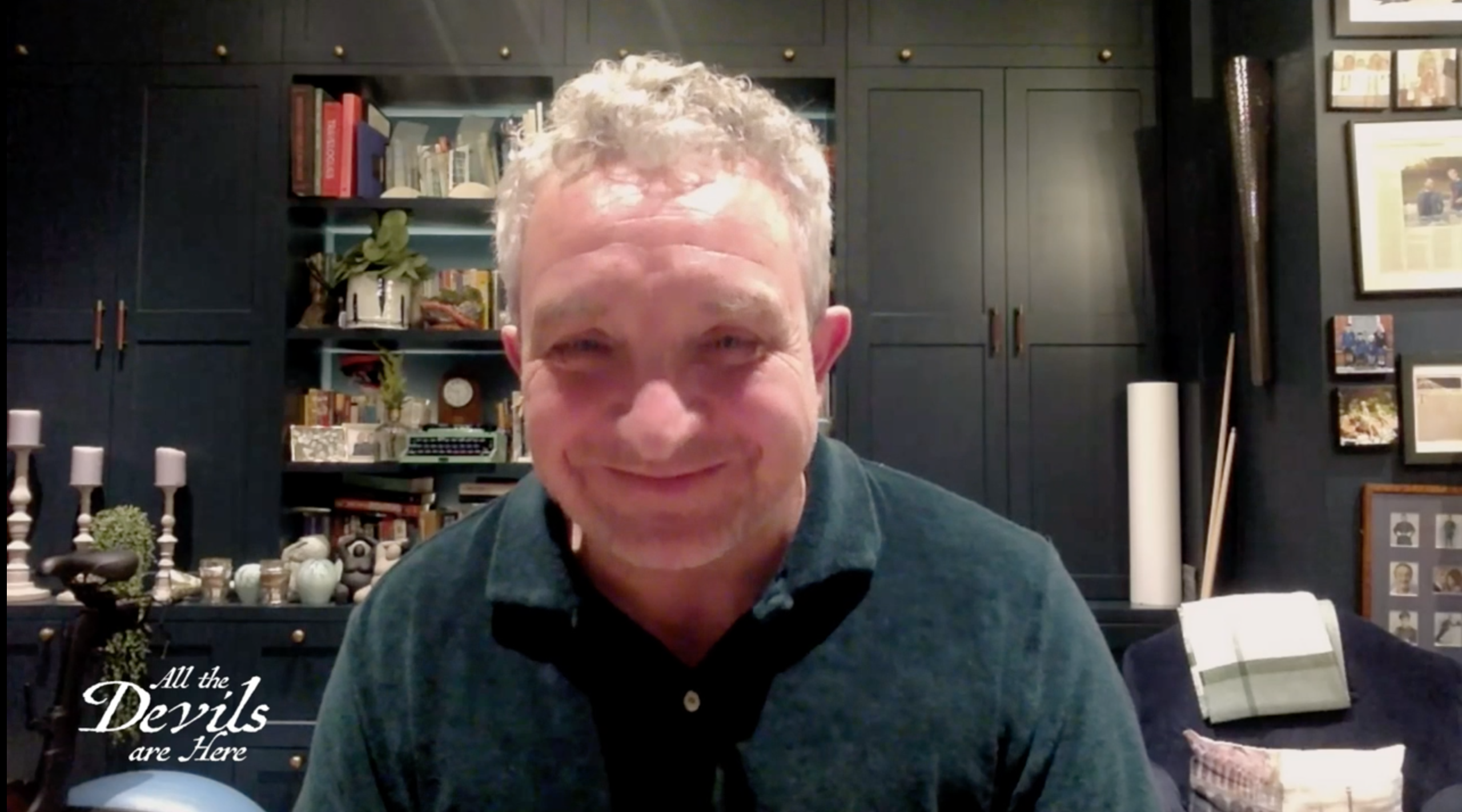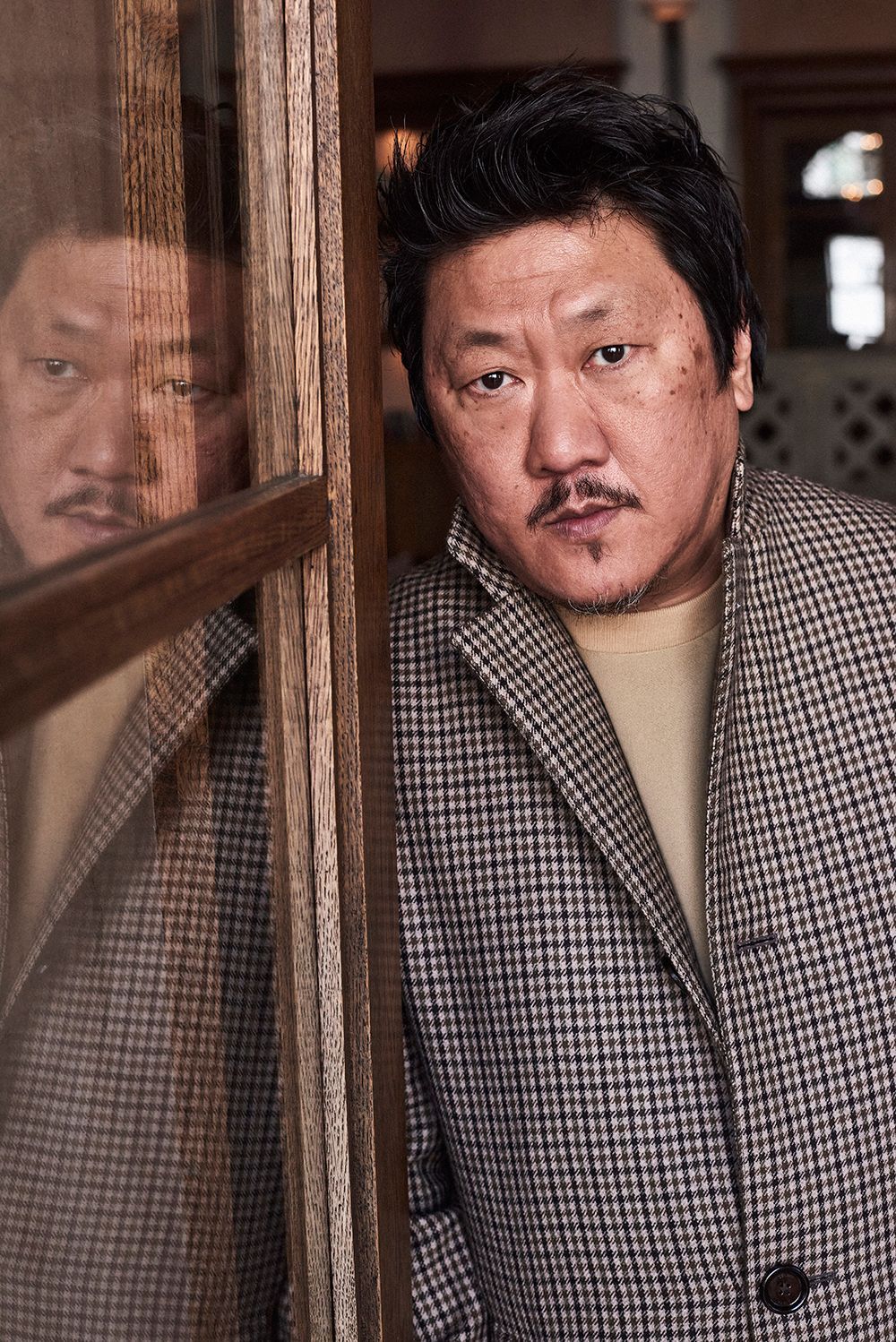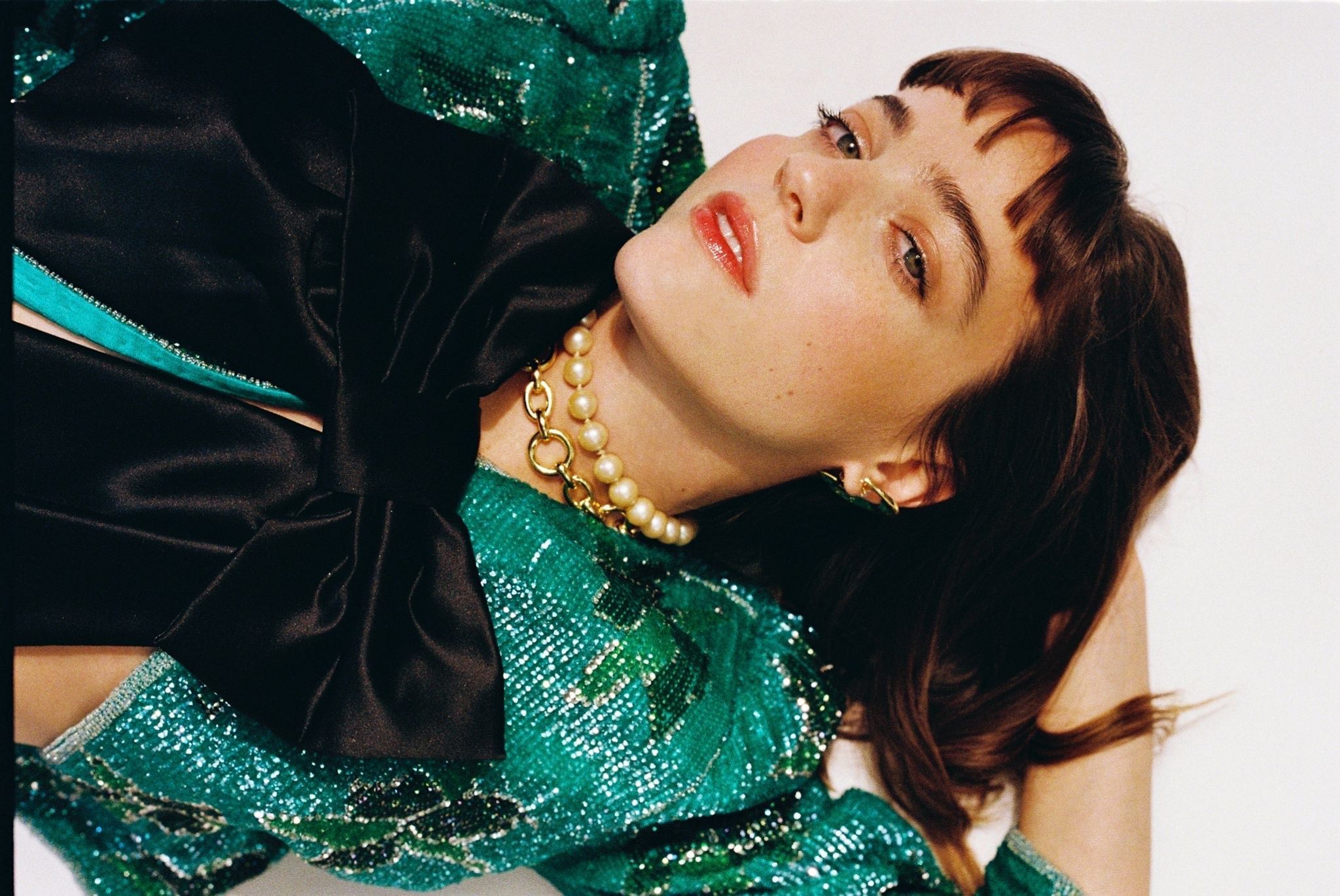This month SKY tv debuts the eagerly awaited adaptation of The Midwich Cuckoos, the 1957 counter cultural sci-fi thriller written by John Wyndham.
A modern day reimagining by David Farr, the 2022 series boasts a fantastical storyline that makes it as much a psychological thriller, as it is a labyrinthine sociological commentary. Women’s fertility rights, bodily autonomy, genetic experimentation, and State-authorized control of the second-by-second lives of citizens are all thematic touchstones that elevate the uniqueness of the show’s dynamism.
Aisling Loftus plays the role of Zoë Moran, a Midwich resident who has fallen pregnant with what she believes is her partner’s baby, only to discover– along with the town’s other pregnant mothers– that she and they are mere vessels forcibly chosen to carry, birth and care for the children until parental nurturance is rendered obsolete. Crucial to the evolution of the storyline is Zoë’s disconnect from the town’s collective psyche through her distrust of the goodness, or innocence, of this genetic invasion, especially since it’s come under the guise of children.
Much like her onscreen persona, Aisling radiates the kind of attentive awareness that stimulates deep thought, as she delves into oft overlooked— yet curiously captivating— angles of present-day concerns. On the eve of SKY tv’s premiere of The Midwich Cuckoos, the actress indulges 1883 in a reflective unraveling of the series’ plot, the worthiness of women’s reproductive rights, and the ahead-of-the-times psychology of John Wyndham.

I’m totally coming off of a high, having watched The Midwich Cuckoos. I was surprised— and intrigued— by the layers within layers of the plot. If you could give our readers a 20 second elevator pitch describing the storyline, what would it be?
I’ll try…In a really, really nice, quiet town a really weird event happens, where all of the women within a certain radius fall pregnant, and these pregnancies turn out to be an occupation…Not really the birth of children, rather the birth of an occupying force…Was that very good?
You nailed it! Because it’s that, and so much more.
Yeah…It’s like basically, the way the John Wyndham novel is written…I kind of feel like it’s from the outside looking in; whereas the way the scripts are written– for the series– it’s like “well what if we got inside that story and saw what it would actually do to people’s heads, to peoples relationships, to people’s lives…and I feel like the show is kind of the blood and guts of it. The story in the novel kind of hypothesizes it…yes, it’s kind of an analysis, or investigation. Whereas this [the script/series] deals with what it [the experience] really does to these women…The book is a bit more forensic, whereas this really deals with the lived experience of this story.
Are you saying the book is more of a scientific investigation, whereas the way you all have fleshed this out for the series is more of a sociological experience?
See?! You’ve got the words. [Laughter]. I haven’t! And I think that that’s true. But also, the book is told from a male perspective— he’s an outsider from the town, and he doesn’t look at the women with a kind of empathetic, compassionate…He’s not like, “Oh my gosh! What if I were pregnant with a parasite?”, and what that would look like. And that’s the thing, because they’re not children, and I had to keep reminding myself that they are a parasitic, other worldly force that has taken on the best disguise as children…Not everyone is a dog person, or a cat person; but everybody is on the same page with children— you protect children. So they’ve taken on the best disguise possible…But yeah, the way that David Farr– the series writer–has…he’s not looking at these women from a distance, it’s not male gaze either…and he’s really considered what would happen to each of these individual people…I really love Jodi’s [Lara Rossi’s] strand of the story— she’s dealing with the grief of losing her sister, Deborah, in the first episode— and feeling like this pregnancy actually means the she’s found herself. I guess my character— in contrast to that— thinks that the thing missing from her life is being a mom, and having a baby. And then it happens, and it doesn’t feel like what it’s supposed to feel like, and that’s a deeply distressing reality for her that she has to keep a lid on. Sorry, I’m going off on a tangent. [Laughter].
I’m loving this tangent, because it touches on the dimension of the storyline on a more human level. There are storylines within storylines, within storylines, and it’s that layered approach that kept me hooked. And it’s interesting, because when you said the book takes the approach of an outsider looking in—not so much with the level of compassion, as through the lens of an investigator— it made me think about the first time I read the storyline of the show. I became curious of John Wyndham and his backstory. He actually lived in a boarding house funded by Quakers, and from this was surrounded by feminist thought, socialist and Communist ideologies, as well as pacifism. And after serving in WWII, he became quite fearful of himself for all of the monstrosities that he had seen, and how it may have unwittingly affected his psyche— to the point he doubted if he could be loved. And much of his work after the war had apocalyptic undertones— in an unearthing, revelatory way. And his most popular works centered on themes of women’s fertility—
You’re talking about the short story, Consider Her Ways?
Yes! And I was thinking, how interesting that he’s conflicted within for not knowing what he’s carrying, as he focuses on women who may be conflicted, not knowing what they’re carrying within themselves, through xenogenesis. I’d love to hear your take on this, having delved into the role.
I think it’s really interesting, isn’t it? I read about him so long ago, and so much life has happened within that year from when I got the part, so some of the things you’re saying, I’m like “oh yeah!”, and he wrote these stories after the war…The thing that I find so fascinating about his stories— because I prepared for the role by reading as much John Wyndham as I could, just so I could see what are his neurosis, or what neurosis is he bringing to it…Like, what are his world views, and who is this man?…And it’s amazing that this is an untherapized person. It’s amazing that he has these insights…these insights that he has into who we are, and what’s at the core of all of this, and is it good or bad. And you know the idea with the Cuckoos— I think it’s in episode 3 or 4, at the mothers’ meeting— and one of the mothers says, “these children are the next generation”, or evolution. And we got to talking about that…sometimes evolution is not going to be good…These children don’t need art; they don’t need empathy. They have survival and efficiency skills— these seem to be the two driving forces. And that’s what I think is such a great thing about the series— we don’t know what the Cuckoos want, but we know that they’re not playing by the same rule as the adults, so we can’t appeal to their better nature, because maybe they’re nature is evolved, and not necessarily better. Do you know what I mean?
I think I know exactly what you mean. And there’s so much to unpack in what you’ve just said.
You know when you’ve come across somebody who has really different politics than you—like really different— and it’s like, we don’t speak the same language, and I could waste a lot of time and energy trying to get on the same page as you, but we just don’t speak the same language. And I think, that’s where they get to with the Cuckoos— there is no common ground, in the end…The Cuckoos do not intend to meet the status quo as it is, whereas all of the townspeople— I believe that’s why that town has been picked— are committed to maintaining the status quo. So, they’ll keep a lid on their distress, a lid on their misgivings, keep calm carry on…that very British idea, which works really well for the Cuckoos to thrive under that cover, and then when they are ready to leave, they’re cold.

Do you think that traits of keeping the lid on the cover, or maintaining the status quo and “keep calm and carry on” are typical of small towns, or are a quintessentially British thing. This inquiry is coming from a native New Yorker. [Laughter].
I think that people…in these really small towns– they’re expensive places to live– so people are buying into a dream: the house with a big garden…These kind of commuter towns outside of London…I think people have a heavy commitment to the dream that they’re manifesting, so if anything kind of disrupts that, it needs to be silenced, or struck down…Well, they can’t strike down these children— that would go against the established morals. We don’t hurt an innocent…Yeah, I think the small town exacerbates it— you care about how you are considered morally, because everyone’s kept in check, morally. And there’s more anonymity in London, where people are more so about their own business, so it wouldn’t have made sense to choose the center of London.
That’s what I was thinking about— how would the Cuckoo’s have survived in London?
I just don’t think they would’ve. It’s very deliberate [choosing a small town]. And also in the book, it happens elsewhere in the world, where this life force has tried to inject themselves in different places around the world, at different times. And this time it works— there’s something about this town and this context that has worked for them to flourish…Since having a baby, I’ve read so much about the psychology of babies and toddlers and parents, and I read something like when babies get to the age of four, they don’t actually need two parents— it’s not necessarily optimal…And then I thought about all of the people I know who have broken up around then…A child’s viability is at its best when it’s had two parents up until the age of four, ad thought “oh, that’s so interesting” because the children in the stories [the Cuckoo’s]— in real life, they’re about five, but they grow at double speed, so they’re about ten— that’s the point at which they say [to their parents], “we can do without you, and will survive without you, because you’re hampering our progress”. So, I wonder if there’s a parallel idea happening there.
I read a few weeks ago that a child learns the most it will ever learn—cognitively— up until the age of five. So, it’s interesting that these superhuman children are doing this at this age in their lives.
And they’ve done all of that intensive learning, but double speed or triple speed. So, I don’t think that’s a coincidence that that’s how it’s been plotted out.
But did John Wyndham know this—we’re discussing this at this degree because we’ve read this, but how did he come to know this information?…I wonder if he actually studied this, or was this all intuitive?
I don’t know…He just seems like a sage, doesn’t he? He had these ideas that were like, ahead of their time, but we haven’t even caught up to them…
That’s the perplexing thing—we have all of these tools accessible to us, like google and various search engines, but they had so much less and knew so much more, comparatively speaking…As a new mother yourself, what do you perceive as the likelihood that something like this would ever happen— women being impregnated by xenogenesis?
What does xenogenesis mean? I haven’t heard that word.
Xenogenesis is when a woman is impregnated by an organism— likely extraterrestrial—and the offspring is entirely and permanently nothing like the parent, or mother, in DNA or inner make up. I just learned the word yesterday. [Laughter].
No, I don’t. But I feel like the idea of this massive fear— the fear between generations— he plucks at that idea as well. I suppose— especially as you get older— you’re so concerned about you and yours, that I can’t even engage with an idea that big. [Laughter]. I can think about how can I prevent my little girl from being bullied at school…I can think about those things, but I can’t really think about those big ideas. I know that there are people who really believe that, right? They think that they’ve been visited by aliens.
We have a lot of that in America.
And some of it has to do with trauma, right? Or a processing of trauma?
I don’t know. I don’t really want to know. [Laughter]…For two reasons: imagine having actually seen alien UFOs, and then imagine actually believing that you’ve seen UFO’s. If you’ve actually seen it, that’s a lot to process, but then if you think you’ve seen it— without actually having seen it—where are you mentally, that you believe you’ve seen UFO’s? So, I don’t want either to happen to me. [Laughter].
Yeah…
Tell me, did you listen to the radio episodes/adaptations of The Midwich Cuckoos?
I did, yeah.
Me too! Just one episode though.
The one with Bill Nighy?
I think so— it was from 2017.
I think I listened to the same one. And I felt like…because our lead [in the television adaptation], Keely Hawse, is playing Dr. Zellaby and the fact that she’s got the investment in this— that this has happened to her daughter— I feel like it gives the story higher stakes and more heart. Not that I don’t think a man could care, but I do think there’s something visceral about it happening to your child, and you knowing what it feels like to carry a baby and for that also to be difficult…I just think it gives the story deeper roots and a greater weight.
That’s another layer in the storyline that I hadn’t even considered. Has your experience within the dynamism of the plot reshaped your perspective of motherhood?
I think the idea of not loving your child—because my character…Wait, have you seen episodes one and two?
Oh, I have! And the scene where your character, Zoë Moran, says “I don’t love her!”, it gripped me, because she was shocked when she admitted it to herself.
And even the idea of that makes me feel ill. When we did the scene, my baby was at home, and I was away from her, missing her, and then I was saying these words. And of course, you draw from your own experiences…and it’s so taboo, so awful to not love your child. And I think playing this part, I had to divorce it a bit from motherhood and see it as there’s somebody living in my house— and it’s not a child— and this somebody means me harm. So, I had to see it like that, rather than as a mother not loving her child, or not liking her child…I had to make that switch, otherwise I do make a judgement of that mother. I would make a judgment of my character, whether that she needs serious help, or to be held and nursed back…because it’s not natural to not bond with, or love your baby. It’s a terrifying place for a mom to be, isn’t it? But that’s not what’s going on for Zoë; she’s the one that actually sees what’s going on. So, at that point, her motherhood story has finished— this is a different story, until she has her baby in episode six.
Wait, wait! I didn’t get to that episode yet— I just finished episode five.
Oh my gosh! That’s amazing.
When I tell you that I’m at the edge of my seat in exasperation, watching the show, I mean it. I got the link yesterday, and binged for five hours—the only thing that stopped me from getting to episodes six and seven was that Cheers came on, and I’m a Cheers fanatic—I watch the show every night. [Laughter]. But I’m definitely savoring these last two episodes.
Those last two episodes— I watched them while my baby was at nursery— I watched straight through from episodes one through seven, and the final two are just so suspenseful, they’re brilliant…It’s kind of like watching a psychological thriller at that point, like “What the heck is going to happen?!”, whereas episodes one through five is about what this does to them psychologically— it’s more strong intrigue driving it.
Yeah. That’s so true!
I’m so glad that you liked it. That’s cool.

Oh yeah, I’m obsessed. Another thing that I did appreciate was the solidarity amongst the women— there’s a sisterhood amongst them that I don’t really see on television— maybe because I’m watching Cheers— but I don’t usually see that kind of female forward bonding…What’s your take on this?
I loved those scenes—particularly the ones where they’re sitting and talking about the children —I really like those. But my character is not in them— she says to Sam [her husband] “I’m not like those women”, I think it’s actually that she’s got this really deep feeling…part of the backstory is that she really wanted to be a mom, and now she has a baby, and she feels like she doesn’t deserve it because she doesn’t love the child, and I think that that brings up so much guilt and shame and anger. And that means that she puts the shifters down and says, “I’m not like you”…I mean, what do you do with all of those feelings, otherwise. You have to push them down, and keep going, and I think she does push them down and keeps going, until Hannah starts to do things that unleashes them a bit out of her. You know, when Hannah starts to physically hurt her. It’s almost like that pain allows her to start feeling how wrong the situation is, actually. She [Zoë Moran] is not the wrong one, but the situation is the wrong thing. It would have been a very different story for Zoë if she had someone to talk to, but she doesn’t. So that’s why she throws off a little bomb in her own life, by kind of going off, and nearly having an affair…She needs to just do something to change her life, and then she realizes that this is not what she wants…But yeah, I particularly love Lara’s journey through the show— she plays “Jodi”. And I love Sinerva’s as well— everyone’s journey through the show is just so well plotted. I think people will be able to see people they know, and see how this affects them through the show…I hope, anyway.
For sure, if you don’t see someone you know, then you see yourself. At least, that’s for me and my experience watching the show…Interesting though is that a show with this storyline is with us in 2022; the women are impregnated, they are informed by the State that their bodies are no longer their own, but that they are subject to the State. And this resonated with me for two reasons— vaccine mandates and Roe vs. Wade— because we’re actually aborting– in both cases– the right to choose what we do with our own bodies. Is there any socio-political issue in the UK that presently parallels what’s taking place on the show?
No, I think it more strongly parallels what’s happening within the U.S. And I think that’s kind of by chance. We’ve got abortion rights here, and I think it’s only recently come for Northern Ireland. And I think the women are so clearly vessels for these outside species, so allegorically— especially for the women in the show who make the choice that they don’t want to be a mother, and they try to sign [the abortion forms], but they physically can’t…I think that, irrespective of what people feel, they will see the injustice of that…Recently, in Northern Ireland, women have gotten abortion rights, but it’s still quite difficult for those women to get abortions because everything has not been logistically sorted.
There’s a similar circumstance in many States here. Oddly, the very first thing that came to my mind when vaccine mandates took effect in the U.S., was that government will assume ownership over women’s reproductive rights—
Really?
Yes, because both issues deal with bodily autonomy, and the right to choose what you allow into your body. If the State can mandate what you put into your body, they can override your choice in what you keep in your body. So, the debate over Roe vs. Wade— for me— was entirely predictable.
Do you think Roe vs. Wade will be overturned?
It’s possible that it will happen as an act of spite by Conservatives toward Democrats in retaliation for other laws that have been passed that Conservatives couldn’t veto.
The crazy thing with that is that it’s a heap of rich white men who don’t raise children— either their wives do, or they have nannies. So, I don’t understand how people who don’t raise children have any business making these decisions. I just get so angry.
If they do overturn it, something—legally, in legislature— needs to be done to make men more accountable in a real way that shakes them up. I mean, it doesn’t sound like the most effective, practical solution, but…
We’ll we’ve got paternity leave in the UK; men can take paid paternity leave, but there’s been so little uptake, because people are so used to it being “the woman’s business”. It’s interesting that the option’s there, but there are some things, societally, that just haven’t caught up…My husband’s amazing, and we’re quite equitable where we can be, when it comes to our little girl, but he’s an anomaly…But the whole thing just annoys me.
At least you’re in the UK.
How much [time] do you get off in the U.S. for maternity/paternity leave?
If you can even get time off, maybe it’s two to three months. It’s not in our corporate DNA to provide that kind of time off— it’s so new to us, that companies now, post pandemic, promote maternity/paternity leave as some kind of novelty to entice people to work for the corporation/business. Paid maternity/paternity is something so common to other countries, but so rare to the U.S., so a big deal, miraculous deal is made of it. It’s like them telling us “We’re not going to charge you for the air you breathe anymore, so be happy and work for us”. And I’m like, “But we’re not supposed to be charged for air”…But back to reproduction, I do feel like Wyndham has a level of reverence for…or at least understood that women’s reproductive rights are worthy of concern, and deep exploration.
Yeah. You know the bit that you were talking about with women being like vessels? When we were shooting the birthing scene— you know when everyone was birthing, and the camera was panning over them— watching it, it felt a bit like an Odessey. The hero’s journey into the world— there’s such violence to the way these babies come into the world— and there’s kind of a violence done to the women as the babies come forth into the world. Our director said she was really thinking about Stanley Kubrick’s kind of style of in birthing, or creating a sort of montage…
I have to rewatch that scene…On a closing note, what do you hope viewers will take away from the show?
The show makes me think about what’s right and wrong and who gets to decide. I don’t know who the villains are. I think audiences will be into that.
The Midwich Cuckoos is on Sky Max and NOW TV
Interview Constance Victory
Photography Bertie Watson
Stylist Charlie Moore
Hair Narad Kutowaroo
Makeup Justine Jenkins
Location Ours Restaurant, London
Top image credits
Green check wool suit Dorothee Schumacher
Earrings Completedworks

